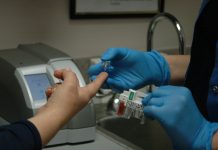
Fructose as a sweetener doesn’t stimulate insulin secretion though it will add calories because fructose contains two glucose molecules. By using fructose as a sweetener, your blood glucose may go up, but not as much as using sucrose as a sweetener.
The use of fructose by people with diabetes was the subject of research a few years ago. It had been suggested that use of fructose by people with diabetes would not increase insulin production. While fructose does not cause your blood glucose to go up as high as sucrose, fructose sweeteners cause
triglycerides to go higher in men when compared to glucose. Fructose is not currently recommended for use by people with diabetes.
Also, there are some misinformed people who support the use of honey instead of white sugar because it is “natural”. Sugar is a “natural” food since it comes from sugar cane or sugar beets, both natural foods. Chemically, honey contains fructose and sucrose which in the end, breaks down into glucose. (Unpasteurized honey should never be given to an infant or young child as it contains bacteria, which could cause a serious infection or death. Honey is usually not pasteurized or heated to kill the bacteria.)
Glucose is the sugar that is found in your blood and the sugar that your body uses for energy to do work. Your body produces insulin to carry glucose inside your cells to release energy for the cells. Insulin is necessary for energy in food to be released. The more glucose in your blood, the more insulin is required to process it.
Your body is a biochemical factory. Food enters your mouth, is structurally broken down by the acid in your stomach, is further reduced by digestive enzymes and hormones in your small intestines and absorbed. The only things your body recognizes are chemicals. All sugars, including starch, milk, vegetable, fruit, white sugar, brown sugar, honey, molasses, and fructose are chemically reduced by your body to glucose. Some foods like starches and sugar cause a greater increase in blood glucose than fruits, milk, and vegetables.



